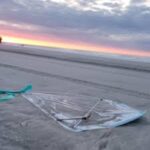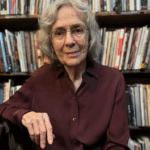Featured Poetry |
“Turning In”

“And how to write to you who would never read this, / to limit the language so that I might reach you on earth and also in this pretend.”

“And how to write to you who would never read this, / to limit the language so that I might reach you on earth and also in this pretend.”

“The most intense emotion she communicates is vexation — a recognition that she’s been shunted into an abyssal, inexplicable place, but is left with no choice but to press forward.”

“while night and day / cities flicker on under the stars / while things go swimmingly in Amsterdam / I doubt Ghouta / could present you a single dewy lawn / or Gaza …”

Choices by Darrell Byers, Molly Coogan, Christoph Irmscher, James Jennings, Tess Lewis, Norman Lock, Esteban Rodríguez, Elaine Sexton, Ben Shattuck, Jenny Slate, Alina Stefanescu, Heather Treseler and Leah Umansky

“What’s dis for? the child inquires, holding out a pair of red tweezers. / The next day, running barefoot through a sprinkler’s spray, a sharp / splinter in her foot supplies the answer, and I try not to look away”

“And when I turned around and my own eyes / Were met with what appears in that vast space / Whenever one looks intently at its circling, // I saw a point that radiated such an intense light / That eyes seared by it are forced to close / Because of its extreme brightness.”

“I try as soul to leap the earth and air between us, but / my dream self can’t get through the gate that marks the Great Divide.”

“I was never what the critics proclaimed — / they never touched the core of me, those smug / assumptions …”

“The scrappy Missouri boy assumed the protective coloring of his affluent in-laws and professional peers. His political views shifted from reactionary to progressive, conforming to values he’d found among New England’s WASPs.”

“The dog will be terrified. I’ll grip its lower jaw with my left hand and lift while pressing down on its neck with my right hand. It’s scary for me, too.”

“Nights and nights at the wooden frame fighting // sleep to finish that quilt — a gift for a couple / whose marriage would last — I fight // for ours”

“My Heresies reminds one that the great devotional poets were rarely doctrinaire, that they often embraced themes that would trouble the conventionally pious.”

“The week after my husband filled out an online application, people from the program contacted him. He was interviewed on the phone for an hour and encouraged.”

“If Guibert was reluctant and prudent about making photos, it was not because he found the medium itself to be corrupt, but rather because his eye was alert for signs of the transitory nature of his own life as a gay man.”

“When you took off your backpack and winced too loudly / at a persistent soreness in your shoulder, the pretty barista / hated you briefly on her otherwise pleasant morning. / The coffee smelled strong. Everyone could see / what everyone was reading. You bought a $12 Heineken.”

“if once you thought yourself smart / if you know what we cannot see with our diligent eyes / if the silver bowl is filled with snow”

“The collection’s most poignant drive is the drive of aging, the awareness of death, and a kind of rising calm and good humor in the face of it.”

“I was in a mausoleum. Stole in, brought my chicken sandwich & Orangina, cozied up in an empty crypt & napped. It smelled like roses in there.”

“There are beginnings upon beginnings, a state of becoming that never takes itself for granted. The poems work by vigilant observation and the negotiation of the feeling that arises from such worldly evidence.”

“dull metal knob / just visible, just ice to touch, / opened on a perfect rectangle of green / pines spread like butter along the edge / of blue lake … “

“Angelic beings dwell in reflections, / her wrinkled face in the kitchen window, / the young man’s profile in the windshield.”

“In 2003, the year after I graduated from college, Davis came to the Brattleboro Literary Festival to read from her new novel called Versailles, about Marie Antoinette. I wasn’t so sure about Marie Antoinette. She seemed like kind of a jerk to me.”

“I keep planting the corn year after year, / thinking I can harvest it before the cows smell / its sweetness and break through the fence …”

“The poets featured here are contemporaries of one another, their work often a result of shared sensibilities, politics, and aesthetics, a response to the work of 20th-century Turkish poets that came before them.”

“A dual focus on extractive capitalism and nature’s increasing fragility, on the former’s slow violence against the latter and its respective citizenry, has been her artistic crucible since Short Haul Engine (2001).”

“I am on the can in the school bathroom / watching a video of Eddie Murphy talking about being a dad. / He says I’m a cool dad and you know he is.”

“Who can live in such ungovernable space? When even / many residents are dropped into a maison bigger than a mall, // they sometimes flounder in their rushing affluence.”

“In Near Distance, there are subtle critiques of those who pursue ‘a greater truth than the one others lived by’ – an acidic appraisal of self-deception posing as social enlightenment.”

“It’s my opinion that the world is created everyday / from all kinds of matter, each unrelated to the other / and their only correlation some quantitative relationship.”

“And the moon looked down upon this unintelligible muck / With not a thought for geraniums, nor madmen, nor landladies / And sighed.”

“Today, as a gift, / I gave my mother a book / on angels. / That was a mistake. / We sat there / looking at the wings in the paintings.”

“The idea / was to hold my breath / and relax, limb to limb, / until someone, ideally / my mother, looked / up from their weight / loss magazine / in horror …”

“Larkin’s poetry, and her writing on recovery for the Hazelden Foundation, has often been concerned with naming silenced experiences and bringing them into the light.”

“Use rusty nails and shells for toenails. / Spiderwebs move into her stitches. // Blend bamboo and voodoo for the updo. / Baleen etched on iridescent abalone.”